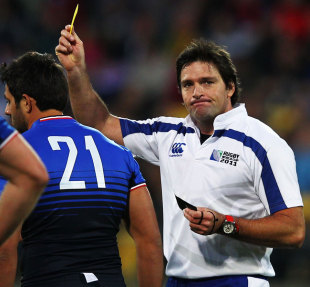|
Rugby World Cup 2011
Referees to take centre stage
Rowly Williams
October 7, 2011

Steve Walsh brandishes the yellow card in the France v Tonga game, yet statistics show officials are letting games flow
© Getty Images
Enlarge
Now the pool stages are over, it's down to the business end of the tournament. That's maybe a harsh way to look at things when some teams have put their heart and soul into the tournament only to be sent packing nursing physical and mental wounds, but those are the harsh realities of competitive sport. The same tough selection process applies to the tournament's officials. But after being watched, assessed, reviewed and selected for the knock-out stages it was always a decent bet that all ten original referees would remain, with the trimming coming among the assistant referees. Having identified who he felt were the best referees for the tournament, the International Rugby Board's referee manager Paddy O'Brien was never going to cast some of them aside half way through the tournament. It stands to reason that if they've been carefully monitored in the four years leading up to Rugby World Cup they were not going to be jettisoned after only four pool matches. The quarter-final referees have now duly been appointed and it will be fascinating to see if the trends shown by each referee, with regards to how they manage matches with penalties, will continue or if we will see a change in approach. The most important thing for these officials now is to referee 'in the moment'. This is all about focusing on the 80 minutes of their match without looking at 'what might be'. Say for example, 'I'm such and such nationality, so what happens if my country gets knocked out later…', or another example, 'Have I been given the quarter-final in preparation for a bigger fixture?'. Of course, this is no easy matter for the officials, but every referee involved has handled matches on the big stage before, so I have no doubt they'll manage each match in the correct manner. Similarly, I expect the assistant refereees running the line to shut out any initial disappointment or block out any 'What's next for me?' thoughts. Of the 242 tries scored in the pool matches, the pleasing fact was that the teams in the final eight have scored 151 of them, so it bodes well that that despite the advent of knock-out rugby there is a genuine ability within all the sides to cross the whitewash. Fans will just hope there is a willingness to play in that manner for the rest of the competition. In terms of the referees for the quarter-finals, the four officials have awarded 335 penalties between them, averaging a touch over 20 per match. Craig Joubert leads the way with 92, followed closely by Steve Walsh on 90, Bryce Lawrence with 78 and Welshman Nigel Owens back on 75. So let's dissect how they've handed those out? Well if we look at just two key areas, Walsh has awarded most scrum penalties with 24, next up is Owens with 20, Joubert on 19 and Lawrence on 17. Taken at face value, Walsh awards the most per match with six and Lawrence the least with a touch over four. So, does that suggest Lawrence allows more re-sets whereas Walsh will ping immediately? As we've said before, stats only start the debate and we will all wait to see how the matches unravel. In the all-important areas of the tackle, breakdown and rucking it's a similar story. Joubert has awarded 45 penalties, Lawrence 38 and Walsh and Owens 35 a piece. So with an average of a little over 11 per match, on paper, it would appear that Wales and Ireland will need to be squeaky clean to avoid the whistle hammering their World Cup hopes. Another interesting point to explore is how the referees have managed different areas of the pitch. In the battle for supremacy in midfield (10m x 10m), only Lawrence has awarded less than 20 penalties (17), with Walsh top with 27, followed by Owens on 25 and Joubert on 20. What does this all mean? If I'm honest, I'm not entirely sure! Reading between the lines, it seems referees are doing their utmost to allow matches to flow. You of course may beg to differ. A snap-shot of the action in the 22-metre area sees the quarter-final referees have awarded 47 penalties to attacking teams between them, but as a highly-organised defensive team you'll be rewarded for good discipline and technique at the set-piece and breakdown, as penalties here reach 75. Curiously it's Walsh who awards most in both categories, with more than double the number going to the defence, (attack 11 and defence 24). So there you have it, entering the all-important knock-out stages we can surmise that all four referees will do what they can to allow matches to flow and manage the players, yet they will not offer an easy ride to any side. A fascinating weekend of rugby awaits. www.therefzone.co.uk © ESPN Sports Media Ltd.
|
Live Sports
Communication error please reload the page.
-
Football
-
Cricket
-
Rugby
-
- Days
- Hrs
- Mins
- Secs
F1 - Abu Dhabi GP
Abu Dhabi Grand Prix December 11-131. Max Verstappen ()
2. Valtteri Bottas (Mercedes)
3. Lewis Hamilton (Mercedes)
4. Alexander Albon ()
5. Lando Norris ()
6. Carlos Sainz Jr ()
-
ESPNOtherLive >>
Golf - Houston Open
Snooker - China Open
Tennis - Miami Open

